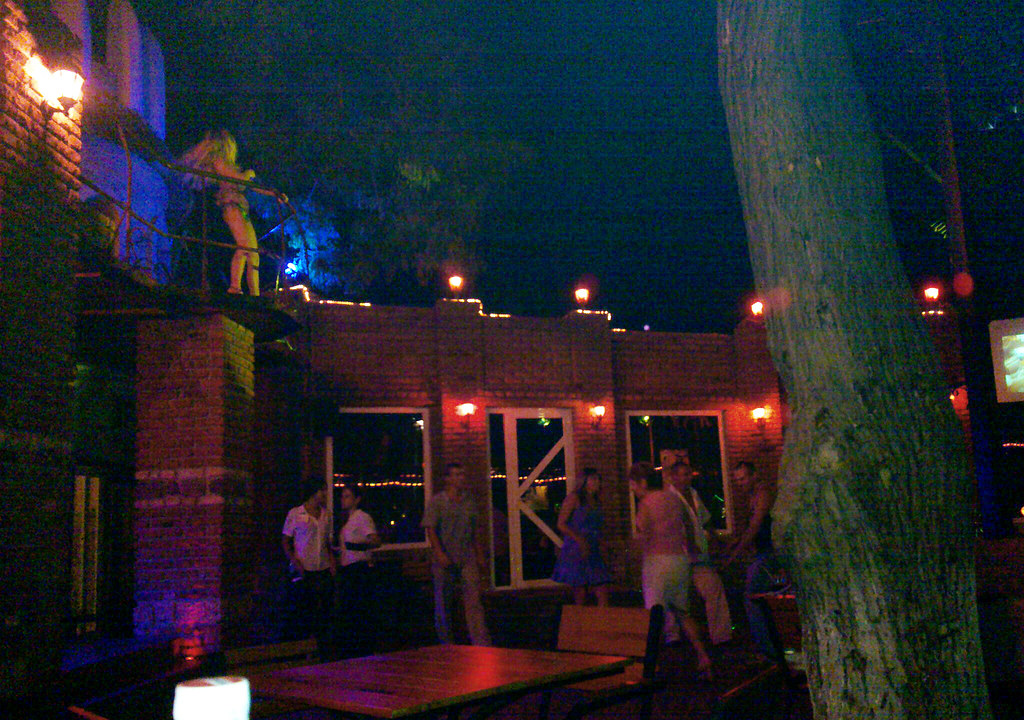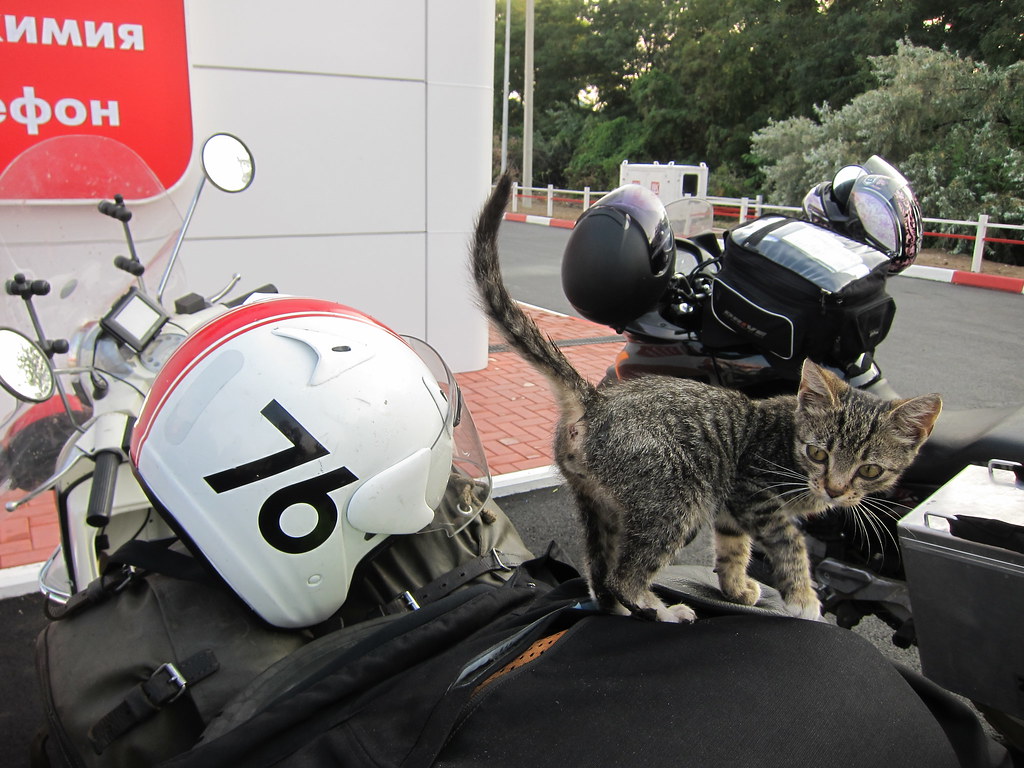The Slow Boat to Russia
ANAPA, RUSSIAN FEDERATION — In my last post, I omitted one minor detail: when I arrived well after dark in Kerch, I ventured downtown to rustle up some grub. I found myself at an open-air restaurant in one of those grand city parks so common to the former Soviet Union. It was half-full, and a few tables had emptied onto the dancefloor where children and old folks and everyone in between were boogying in that sincere Russo-Ukrainian way. On a platform above the action, a bethonged go-go dancer did her thing. I thought that was a nice touch, and hunkered down on my umpeenth bowl of borscht of the trip.
Halfway through the crowd favourite, Boney M‘s Rasputin, the dancefloor degenerated into the biggest brawl I’d ever seen. The go-go dancer vamoosed, as did the DJ. At least three factions formed and went toe-to-toe, but as the fight progressed, alliances shifted, and everybody at some point had a go at everybody else. One guy in particular, a barrel-chested family man with a face drowning in fat and muscle, was my clear favourite to win. He took punch after punch and simply shook them off with a shake of the head, like he’d just thrown back a shot of stiff booze. And then he’d answer back with single, devastating hooks, flattening whoever was unfortunate enough to be in his purview.
On and on it went in front of me as I cowered behind my netbook. The cops showed, but neither they nor the bar staff did anything to break it up. Only the women did anything to try and put a stop to it, which was impressive: many of them got right in the middle of it and took accidental elbows to the head. One by one, the exhausted and bloodied sluggers wandered off back to their tables, while one guy — the most aggrieved party, I’m guessing — decided he’d take out his frustrations on the restaurant itself. He ran up to the bar, grabbed the terrified bartender by the shirt, and hauled him over the counter like he’d done it a hundred times. He then strolled behind the bar and started grabbing top-shelf bottles of booze and smashing them on the floor, taking time between each bottle to scream something I couldn’t understand but found incredibly funny. After the fifth or sixth bottle, the cops decided that was the last straw — that was private property! — and they chased him towards the indoors section of the restaurant. Exeunt all to the sounds of more screaming and breaking glass.
After the excitement of fight night in Kerch, I set out at 9 in the morning to catch the 1:30 boat to Russia. The ferry terminal was a good 10 clicks from the city, and after a few twists and turns down back roads I met the back of the vehicle queue. It was a long one, about a hundred cars, and it was clear they’d been there a while. A few people dozed on sleeping bags on the road, oblivious to the garbage blowing past them like tumbleweeds. Not wanting to be part of that sorry scene, I rode around them and hauled ass to the front of the line. There, I ran into some fellow two-wheeled travellers:
Crossing a complicated border like this, it turns out, is far easier when there’s more than one of you. You can set off in opposite directions, gathering intelligence about various tasks, and regroup and compare notes. The exit procedure at Ukrainian customs was baffling, and at no point was it clear whether or not we’d get on the boat that day: one scowling official kept telling us to go to the back of the line, while another guy told us to sit tight and maybe we’d be issued the precious numbered plastic stick that gave us the privilege of buying a ferry ticket. I had half a mind to do as I was told and go to the back of the line, or maybe even head back to Kerch and try again at first light the next day. Christian, meanwhile, proposed sticking around and seeing if we could finangle our way on. He turned out to be right. Come midafternoon, we’d been issued those plastic sticks, bought tickets, made our way through customs, and were crammed aboard a boat that would ferry us across the straits of the Sea of Azov.
The ferry was two hours late in leaving, and I chatted with my new Swiss road buddies and got some sun. As we approached the Russian port, the horde of pedestrian passengers pushed and shoved and clambered over one another towards off-ramp at the bow, which I found indescribably rude, but they evidently didn’t. Nobody seemed perturbed by this free-for-all; they were all trying to shave off precious minutes and hours at Russian customs, and this jockeying for position was fair game. So, I stood next to my bike, clutching it as tightly as I could to ensure the mass of humanity flowing past didn’t knock it over. Christian did the same with his TransAlp. One little guy, whose mother had shielded him from the sun with a towel on his head, succeeded in picking off the Vespa badge on the side of the Hamburglar. Thanks a lot, kid.
On this ferry, with its high walls, I couldn’t see anything but sky, and the first thing I glimpsed of Russia was the concertina wire running the length of a very tall fence. After the bow ramp went down, everybody made a run for it towards the customs booth. Christian, Miriam and I started our engines and followed suit, using our position at the front of the boat to our advantage. We were among the first vehicles to reach customs.
The official behind the little window of his air-conditioned hut wore an enormous peaked cap and an immaculately pressed shirt, and he exuded professionalism and competence. That is, until it came time to enter my details in the computer. I saw him hunting and pecking for each letter, taking his sweet time between each keystroke to consult a printed comparison chart. It was clear the guy couldn’t read the Latin alphabet and was transliterating my name, birthplace, etc. into Cyrillic. I looked back at the dozens of cars stretching back towards the waterfront and wondered how long those poor bastards would have to wait. (I shouldn’t be too critical; my own grasp of Cyrillic isn’t so hot, and I can’t imagine there aren’t many non-Russians and Ukrainians crossing this border anyway.)
While he hunted and pecked, the drug-sniffing cocker spaniels milling around took little interest in the Hamburglar, and I learned I needed some rubles to pay a road tax or importation fee of some sort. I was soon off to exchange some dollars — at this border with Ukraine, the exchange office didn’t accept Ukrainian currency — after which I stumbled around from desk to desk, having papers scrutinized, documents scanned, and orders barked at me in Russian. At one point a lady thrust a USB stick at me and pointed an ornately-painted fingernail towards an office down at the other end of the building. I liked the combination of hi-tech (flash memory) and low-tech (walking), and wondered if they’d considered having the USB drives shunted around the office by pneumatic tubes instead, or possibly carrier pigeons. I then considered informing her of the existence of local area networking, which would obviate the need for little pen drives completely, but the more I thought about it, the Russian solution was crude but reliable. If they had all those documents on a LAN, and the LAN went down (as they do), so, too, would the border. (They could, of course, eliminate the need for all that documentation entirely, but let’s not get ahead of ourselves.)
About two hours later, I was done jumping through hoops. Christian and Miriam weren’t so lucky; their Swiss insurance didn’t quite have the same cachet as my own Serbian green card in this part of the world, and they had another hour of running around to do. They met a German-speaking Ukrainian who’d crossed this border dozens of times before, and he guided them through the byzantine process of buying insurance. After signing multiple pages of contracts he didn’t understand and handing them back to the clerk, Christian was told by the Ukrainian: “Congratulations. You’ve just sold her your bike for one dollar.” It took Christian a few seconds to realize he was joking. Meanwhile, I’d bought an ice cream and leaned back against the customs building to watch the gong show. Then, on the tinny PA system running throughout the customs post, somebody cranked some tunes. They sounded like Russian covers of sunny Italian pop hits from the ’50s, and my Vespa looked at home in the scene.
Armed with our sheafs of documents, Christian, Miriam and I hopped on our bikes and waited for the enormous armoured gates to be opened. We agreed to ride as far as we could together until we didn’t feel like riding any more. We went at full throttle eastwards — well, I was full-throttle; Christian and Miriam, on their 650cc bike, probably were at considerably less than that — and took in the scenery. It couldn’t have been more different from the desolate wastes of the eastern Crimean peninsula: the land here was lush and fertile, and farms looked well-tended and prosperous. What’s more, somebody’s tax rubles were being spent on keeping the roads in reasonably decent shape. I was very appreciative of that. We pulled over for some cheap Russian benzine, and the Hamburglar made friends with a local gas-station koshka.
Eventually we decided to call it a day at Anapa, a seaside resort town that’s popular with families. We rode around for an hour until we found a reasonably-priced guesthouse with free rooms. There, I managed to distinguish myself as a true diplomat. The proprietors of the guesthouse had slightly darker complexions than most Russians, and the lobby was adorned with all sorts of vaguely oriental frippery, and so I guessed that they were members of the vast Tatar diaspora that Stalin had exiled from the region back in the ’30s and was slowly trickling back. “So,” I said to the guy at the front desk, confident that I had a handle on things, “you’re… Tatar?”
“No,” he said, his face darkening. “Armenian.”
“Whoopsie-daisy,” I said, and resolved never again to ask complete strangers about their ethnicity. He took it in good stride, though, and was hugely hospitable in helping me find a home for the Hamburglar.
Christian, Miriam, and I then dropped in to a sidewalk restaurant for some şışlıq, beer, and for me anyway, some greatly appreciated conversation in fluent English. Christian’s an IT guy from just outside of Zurich, and he thinks travelling great distances on two wheels is just boffo. Miriam, meanwhile, is very much into camping. Lucky for them, their two passions fit together quite snugly. They’d taken six weeks off their jobs and were doing a circuitous route from Switzerland, around the north side of the Black Sea, then over into the Caucausus, and then down to Turkey and back to Switzerland via the Balkans. They were both on their way to Sochi, followed by a trip up to the mountains of Abkhazia; I was headed that way too, and we agreed to ride down the coast together. I just hoped I’d be able to keep up.

















December 14th, 2012 at 11:55 am
You have done and excellent job on this article. Your writing technique is impressive and surpasses this reader’s expectations. Your thoughts are presented in an interesting, unique manner. I’m sure you will influence many readers.
December 14th, 2012 at 12:09 pm
I appreciate quality writing when I read it. This is truly a great writing. You make sound and compelling points presented in a fresh way within your content. Your views are very different and original.
December 14th, 2012 at 1:00 pm
Catering is iets wat genoeg financiën kan vraagt. Dat is natuurlijk een uitputtend als je een receptie gaat geven. Je bent dan misschienheel genoeg financiën kan vraagt.kwijt. Om financiën kan vraagt.te uitsparen kun je uitkijken naarnaar een cateraar in je dorp. Zo’n cateraar hoeft niet zo genoeg financiën te bedragen, maar misschienzijn eten bezorgers in je dorp best wel duur. De eten bezorgers vragen best genoegfinanciën. Om te behoeden dat je moet financiën kan vraagt, moet betalen voor een eten bezorgt kun je het best flink suggestiessturen naar velerlei eten bezorgers. Bij restaurants is het soms hetzelfde. Als je niet zo lekker wilt eten kun je uitkijken naar gaan naar een groots restaurant. Is niet altijd even leuk omdat er zo ontzettend genoegrestaurants zijn in Friesland. Echt velerlei restaurants. Heel heel veel talrijke restaurants. Het is afgelopen
December 14th, 2012 at 2:14 pm
Türkiyenin en iyi proxy sitesi
December 14th, 2012 at 2:44 pm
wedding updos